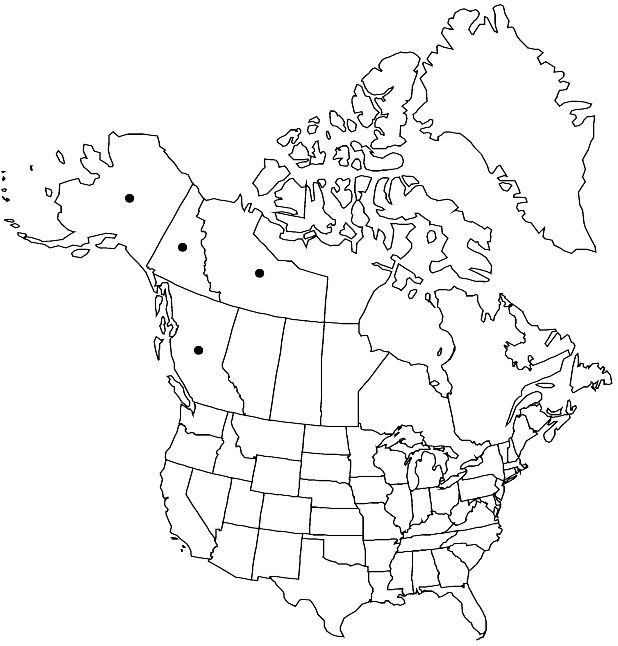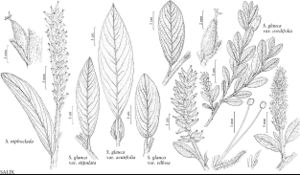Salix glauca var. acutifolia
Bot. Gaz. 66: 327. 1918.
Plants 0.3–6 m. Stems: branches redbrown or brownish, villous or pilose to glabrescent; branchlets densely villous to glabrescent. Leaves: stipules marcescent, rudimentary or foliaceous on early ones, foliaceous on late ones, usually prominent, linear to lanceolate, 2–17 mm, apex acuminate; petiole 4–27 mm, pilose adaxially; largest medial blade oblanceolate or obovate to narrowly elliptic, 43–82 × 12–39 mm, 2.2–4.8 times as long as wide, base cuneate or convex, apex acuminate or convex, abaxial surface very densely to sparsely villous-tomentose or short-silky, hairs straight, wavy, or curved, adaxial long-silky or pilose to glabrescent; proximal blade margins entire; juvenile blade densely villous or long-silky. Catkins: staminate 19–45 × 9–17 mm, flowering branchlet 2–9 mm; pistillate slender to stout, 24–83 × 8–17 mm, flowering branchlet 3–37 mm; floral bract tawny, light-brown, or bicolor, 1.5–2.5 mm, apex convex to rounded, hairs wavy. Staminate flowers: abaxial nectary 0.1–0.6 mm, adaxial nectary narrowly oblong, oblong, or square, 0.6–0.9 mm; filaments distinct, glabrous. Pistillate flowers: adaxial nectary sometimes flask-shaped; stipe 0.5–2.8 mm; ovary obclavate or pyriform, densely tomentose, short-silky, or pubescent, beak gradually tapering to styles; ovules 12–22 per ovary; styles connate to distinct 1/2 their lengths, 0.3–1.4 mm; stigmas slenderly to broadly cylindrical, 0.4–0.59–0.8 mm. Capsules 5–9 mm. 2n = 76, 95, 114.
Phenology: Flowering late May-early Jul.
Habitat: Wet to mesic thickets, black spruce treed bogs, white spruce woods, floodplains, fens, swamps, subarctic thickets, alpine tundra
Elevation: 0-1200 m
Distribution

B.C., N.W.T., Yukon, Alaska.
Discussion
Hybrids:
Variety acutifolia forms natural hybrids with Salix arctica and S. niphoclada.
Variety acutifolia × Salix niphoclada, known from Alaska and Yukon, is intermediate between the parents. It combines the petioles, the narrowly elliptic-oblanceolate leaves with acute-attenuate apices, the stipules, and the narrow, loosely flowered catkins of S. niphoclada, and the relatively long petioles, the larger oblanceolate leaves, the larger stipules, and the densely flowered and broadly cylindrical catkins of S. glauca (G. W. Argus 1965).
Selected References
None.
Lower Taxa
"-0.8mm" is not declared as a valid unit of measurement for this property.
